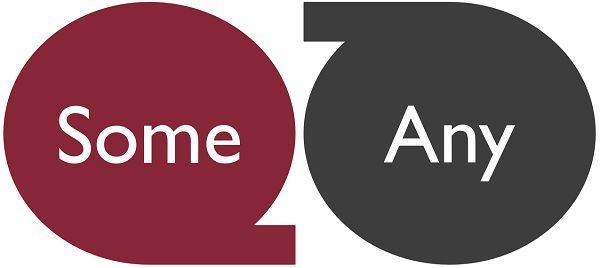One of the most challenging parts of English grammar for non-native speakers is understanding when to use ‘some’ and when to use ‘any’. It would be easy to explain the difference as ‘some’ being used in positive sentences, and ‘any’ being used in negative sentences. However, as is the case when explaining other aspects of grammar, it’s not as simple as that…
When speaking English, you can say some, any or you can have no article at all, before nouns which are plural or uncountable.
- I have some biscuits = j’ai des biscuits
- Do you have any beer? = vous avez de la bière ?
- Do I need paper? = ai-je besoin de papier ?
When do we know when to say ‘some’ or to have no article?
The difference between ‘some’ and using ‘no article’ is not big. However, when we say ‘some’, we are really talking about a certain quantity, but we either don’t know or we don’t specify the exact amount.
When we say ‘some’, we mean ‘a certain quantity’ of something. ‘Some’ is not used if we are talking about something in general or thinking about it as a group or category (French – ‘dans l’ensemble’). When we use ‘some’, we don’t quantify something, because the exact number or amount is not the most important thing. However, it is quantifiable if we need to know. For example:
- Can we buy some bread?’ = peut-on acheter du pain ?
Here, we don’t know exactly how much bread, but we want only a certain amount – not all of the bread in the shop.
However, we also use no article when the quantity is not relevant. It’s used to talk about the noun as a group or category, rather than a certain amount of it:
- You need flour to make cakes = on a besoin de farine pour faire des gâteaux.
Here, we are talking about flour as a category and not about a certain amount of flour.
The difference between some and any:
We use any in the same way as some, that is, when we are thinking about a certain quantity of something.
We usually use some with positive sentences and any with negative sentences and questions:
- She bought some bananas = elle a acheté des bananes
- She didn’t buy any bananas = elle n’a pas acheté de bananes
- Did she buy any bananas? = a-t-elle acheté des bananes
The exceptions to this rule are:
1) Any can be used to mean ‘it doesn’t matter which one’. In such cases, it’s usually used with singular countable nouns:
- You can take any road = vous pouvez prendre n’importe quelle route
- Give me any pen = donnez-moi n’importe quel stylo
- You can visit any weekend = vous pouvez visiter n’importe quel week-end
Any can also be used in positive sentences which have a negative sense, for example if they include never, hardly, barely, without:
- He never reads any books = Il ne lit jamais de livres
- They hardly visit any museums = Ils ne visitent guère de musées
- David travelled without any baggage = David a voyagé sans aucun bagage
- They wear barely any clothes = Ils ne portent presque pas de vêtements
Some can be used in questions when we expect that the answer will be ‘yes’ and when we politely make offers and requests politely:
- Would you like some tea? (I think that you are probably going to say ‘yes’) = voulez-vous du thé ?
- Could you give me some help? (I think that you will probably do so) = pourriez-vous m’aider ?
- Could you pour me some wine? (of course you will, because I have asked politely) = pourriez-vous me verser un peu de vin ?
Any is usually used when we don’t know if the answer will be yes, or if we expect that the answer will be ‘no’. The difference can be seen in the two following questions which both mean the same thing in French ‘Avez-vous des cadeaux pour moi ?’:
- Do you have any presents for me? (I honestly don’t know if you have any presents or not) = avez-vous des cadeaux pour moi ?
- Do you have some presents for me? (I think that you probably do)
So, as you can see, the differences can be subtle, but it is worth learning the differences to avoid confusion, and, of course, to sound more natural.
If you have enjoyed reading this blog, please ‘like’ it and share it with your friends and colleagues, and if you know anyone who might be interested in my online one-to-one lessons, please do ask them to contact me to discuss how I can help them to excel in English.


Recent Comments